Embracing the fear of failure on Mountain Leader assessment
By Jessie Leong
@jessielphoto
There are many reasons why a Mountain Leader assessment inspires feelings of discomfort and anxiety. I thought I’d share my Mountain Leader (ML) journey from overcoming fears of failure and adversity to finding success and confidence despite the pandemic.
Back in 2016, I went for my assessment the first time with a national outdoor centre and experienced my first dose of failure. Underprepared, I had ‘linked’ it up with attending a climbing meet at the Emily Kelly Hut with The Pinnacle Club, right before a 5-day gruelling assessment, which probably wasn’t the best idea at the time. I had little understanding of what it felt like to be under scrutiny (at the time, I hadn’t even passed my driving test) and so found the assessment process wholly overwhelming. My kit was sub optimal, with a heavy, leaky bag and a wet sleeping bag. I was told I was able to borrow a tent, and found to my misfortune that I had borrowed a tent without pegs. My torch was just light enough to light my tent, but utterly useless at being able to see any of the night navigation features I was being asked to take the group to. Several inches of snow arrived on the second night of the expedition. It was overall, generally horrendous. Post debrief, I quietly croaked out my thanks, before I walked aimlessly towards the gear shops in Capel Curig. I bawled my eyes out before I bought a new fancy head torch and consoled myself, vowing that I would not put myself through that process again.
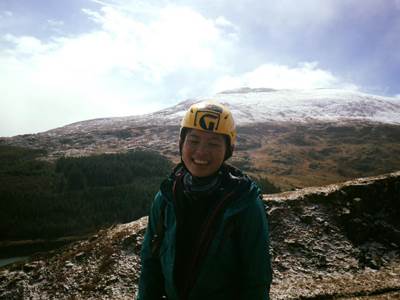
It has taken me the best part of two years to listen to friends and colleagues who told me I should reconsider re-assessment and commit again to the process.
Fast-forward to January 1st 2020. A sparkler feebly fizzled in the damp, wet night of a new year, which marked halfway through a winter season working in Iceland as a snowmobile guide. Iceland had felt like a lonely, isolated place to work things out. Colleagues asked if I would stay ‘til summertime, when they told me Iceland was a magical, otherworldly place of midnight sun, geothermal pools and purple arctic lupines. I decided that instead I wanted to go back to the UK and deal with unfinished business - the completion of my ML.
With my Icelandic journey due to finish at the end of March, I decided to set myself a goal and book my assessment with an independent provider, who originally offered options to take the assessment on Isle of Rum, before this was moved to North Wales.
Self-doubt, holding limiting beliefs that I projected onto myself - e.g. not being fit enough, not being strong enough to keep up with my male peers, not trusting my feet on wet rock, worrying about not being credible enough, being scared of night navigation, worry over financial insecurity chasing freelance work/zero hours work and ultimately the morality of travelling from England to Wales ahead of a national lockdown were just some of the mind chatter I’ve had in my head.
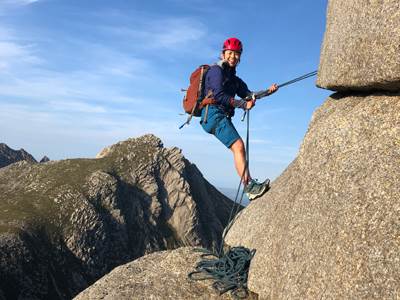
Ultimately, I think I was scared of failure (and more importantly, re-failure), which had been conditioned into me as being socially unacceptable and taboo. I felt panicky when I went out with a map and compass and put under pressure, I was constantly self-moderating myself and worried that I was using overly effeminate words like ‘I think’, or ‘I feel I’m at X’ and I felt like fear of doing my ML assessment once more was always going to hold me back.
What inspired me to do my assessment this time?
Perhaps out of tough conditions come tough people…
A week of bad weather was forecast, a with gusting winds of 55mph on the summits of most mountains. Watching a grey-eyebrowed Welsh politician reminding us that a second national lockdown was imminent. Or maybe it was the sight of a vastly expanding expedition backpack bursting at the seams, alongside my daypack and the food bag that I had packed and repacked, and yet still sat on the living room floor in the morning waiting to be loaded into the van. Preparation and organisation were skills I had plenty of experience in, yet when there was a deadline, my mind felt overwhelmed. Time has a habitual way of speeding things up, even when one dreads its arrival, and I had resigned myself to the fact that I had run out of ways to procrastinate, and it was time to drive over to North Wales and tackle my Mountain Leader assessment.
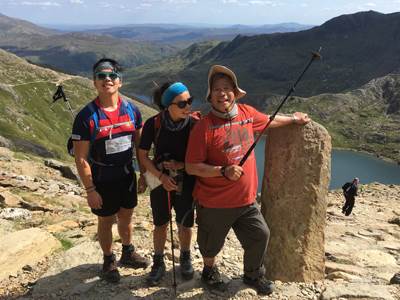
What were the benefits of getting the Mountain Leader qualification?
Wanting to do more with my qualification inspired getting my Mountain Leader assessment. I worked with an outdoor provider who worked as a cooperative, and was keen to offer me opportunities to work that included taking groups of kids out on Duke of Edinburgh’s Award Bronze expeditions. As a Mountain Leader trained instructor, technically I wasn’t allowed to operate in mountainous terrain, and so a lot of environments from the rolling fells of Edale and Kinder, would be outside of my remit. Having the qualification would allow me to demonstrate experience, credibility and give me a benchmark to be compared against - yet it also meant overcoming a massive personal mental barrier.
What helped me get there?
Having people I approached to be my mentors, both informally and formally, helped make a massive difference. I’ve learnt that I needed to re-learn and associate being in the outdoors with being passionate about being in mountains, and to not associate it with pressure.
My advice for aspiring Mountain Leaders: 1) Create your own circle of radiators, not drains and 2) be honest with what you think you need to do to get yourself in the right headspace.
I wanted to focus on steep ground, planning my own expedition routes and getting night navigation sessions logged. I created a plan with my mentors that I would make sure I did these things in the last 6 weeks ahead of assessment and this massively help soothe my anxiety that I wasn’t doing enough.
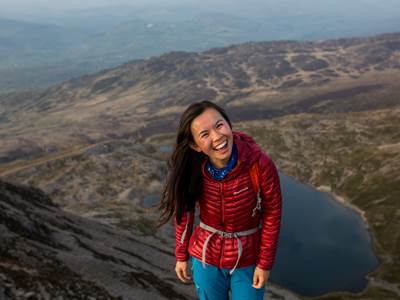
How did I go about doing it?
For steep ground practice, I headed out to the Lake District and met with a friend at Patterdale. We took it in turns to lead various steep sections on Striding Edge and Swirral Edge.
For the expedition practice, I offered a few close friends an opportunity to catch up, on the proviso that by going on an expedition it would allow me to practise route planning, packing an expedition bag, mountain scenarios etc. I tailored the expeditions to fit their needs e.g. one friend was conscious of a shoulder injury so we had to take it steadily on some steep ground. I had a mini-expedition in the Langdales, a wild camping trip over the Carneddau and an exploratory trip over a lesser-visited part of Northumberland.
For the night navigation element, I persuaded friends to come out with me and practice some routes using orienteering apps and navigation routes offered by local providers such as Will4Venture. Practising looking for micro features on Bleaklow and Burbage Moor was incredibly useful to get experience navigating off path and in boggy, moorland terrain, which wasn’t dissimilar to the mountains.
Who did I do it with?
I completed my Mountain Leader with Snowdonia First Aid. For me, attending the refresher put many of my anxieties at ease, and their reassurance and practical application of the Mountain Leader demonstrated to me that I could relax in their presence.
What was the week like?
The first two days of my Mountain Leader went to plan – using 1:25,000 maps, I did my leader talk on female first ascensionists, demonstrated confidence moving on steep ground and rope work sessions went without a hitch (pun intended). The expedition proved more challenging - with little to no visibility on the summits, we initially started on 1:40,000 maps before switching to night navigation conditions by mid afternoon. We navigated through to dark, stumbling through the boggy hillsides of the Moelwyns, trying to find obscure squiggles and rogue contour features. The expedition allowed us to focus on relocation, reading the terrain and multiple uses of micro navigation in remote mountain locations. I also had to look after the group for half a day, which proved fairly challenging when everyone was carrying a much heavier pack and demonstrating varying levels of fatigue. The testimony to the challenges of the expedition element was how few photographs I took – the only useable images were the ones where the weather cleared on the second day prior to setting up camp. The number of layers showed how chilly it was layering in cold and damp mountain weather conditions - we pretty much wore waterproofs for the duration of the expedition assessment.
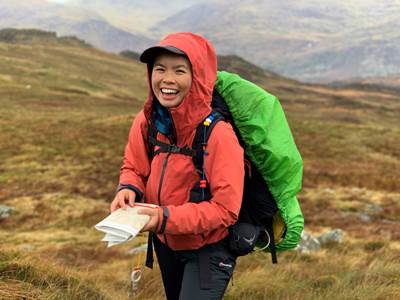
Lasting thoughts...
For anyone considering doing their Mountain Leader, I would recommend doing it. It’s a challenging, rewarding process, and one that will be different for each individual – but ultimately it’s about reminding yourself the reasons why you enjoy being in the outdoors and sharing your experiences with others.